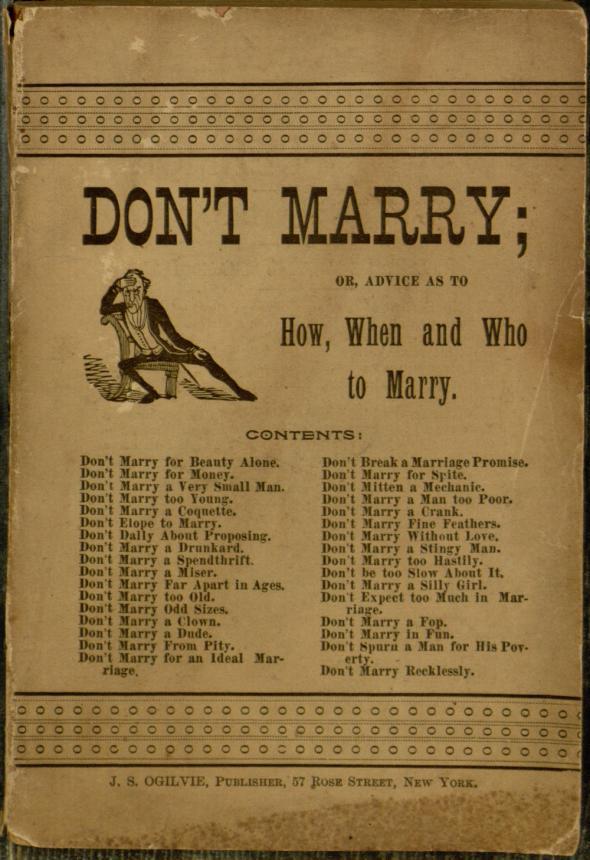This fun book, which offered young lovers advice on wise courtship, was one of a series of dime novels printed and sold cheaply in New York City by the J.S. Ogilvie Publishing Company in the late 19th century. It’s recently been digitized by Villanova University’s Falvey Memorial Library.
The 112-page book, which I’ve embedded below, can also be read on Villanova’s website—and I recommend the experience. Here are some highlights.
Don’t marry a rich woman, because they will inevitably remind their husbands of their upper hand, “making one a pensioner all his life for his board and clothing.” “If there is any difference,” “Hildreth,” the book’s author, opined, “it should be with the man. He is expected to control property. He is the master of his house, or the manager of his expenses.” (Hildreth dispenses more of these gender norms in a later section advising men not to moon over women: “Women despise a fawning, cringing nature. ‘Fortune and women, born to be controlled, stoop to the forward, and the bold.’ “)
“Don’t marry a villain”: “A friend met one on the Pacific road, married him, and learned to her sorrow that he drank to excess, swore like a pirate, lived in debauchery, and early offered to swap wives for a season with a boon-companion.”
“Don’t marry a doubly divorced man or woman”: “It’s risky. Something is wrong surely. One divorce should cure any one. Two is a profusion.”
Don’t marry your cousin, even if a “long and intimate acquaintance” has left you feeling warmly toward him: “With many persons, marriage of blood relations will more or less lead to deafness, blindness, or deformity,” Hildreth writes. (This is proto-eugenic advice; it’s interesting that it’s to be found in a cheap book available to many readers, as early as 1891.)
Don’t marry for looks: Hildreth is a bit contradictory with her advice here. On the one hand, she preaches against superficiality, using historical examples: “As the soldier said of Grant’s face, after Shiloh’s bloody battle, ‘That was the handsomest face I ever saw’; yet it was plain and dusty and rugged.”
But, on the other hand, women should not marry a very small man: “Try to get some form to admire, something to shape things to, and some one who is not lost in a crowd completely, who is too little to admire and too small for beauty.” In fact, neither men or women should marry people very much taller or shorter than themselves: “Pair off like soldiers in time of dress parade, with an eye to unity.”
Don’t marry somebody whose character you have not investigated: Many, Hildreth writes, “marry and risk a life-long happiness on less actual information of each other’s real nature than a good horseman would exact of his carriage horse’s pedigree. This may do in the country, but never will answer in a city.” Prospective spouses needed to ask questions.
The difference between the due diligence required of a suitor in the rapidly growing late-19th-century city, versus the country, was one of Hildreth’s favorite subjects. Like other 19th-century Americans, Hildreth mistrusted the melting pot of urban life, where people’s true natures could be cloaked or misrepresented. “Take the country population, and ninety per cent will be good,” Hildreth writes later. “Sixty per cent of all cities are people of fair characters.”
“Don’t mitten a mechanic”: Using a 19th-century verb form of mitten meaning the rejection of a suitor, Hildreth begs women not to snub a tradesman “simply on account of his business.” This was short-sighted. “If he is worthy, never mind his business. He can grow out of it, and will grow out of it. Collier was a blacksmith, Wilson a shoemaker, Andrew Johnson a tailor, Peter Cooper a glue-maker, Grant, a tanner, and Lincoln the humblest of farmers.”
“Don’t marry a dude”: “A street flirt, a hotel-step gazer, an eye-glass ogler, a street strut; one who finds his enjoyment in the looking-glass—a masher” (or, a flirt—a category given its own “don’t” section). Another word for this is a fop, a type of person Hildreth calls “a namby-pamby female male.”
“Don’t marry a clown”: “Fun will grow stale and threadbare; one cannot live by it. Life is a trip that costs car fare, wash bills, board bills, trinkets, notions, and actual outlays. Real providers are never clowns; the clownish fellow is a favorite in school-days. He is so cute, just as cute as a cotton hat, so cunning, so witty, so nice. Is he? Wait a few years, until his nice nonsense turns to active business!”
